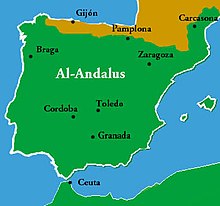Tariq ibn Ziyad
Tāriq ibn Ziyād ( Arabic طارق بن زياد, DMG Ṭāriq b. Ziyād , tamazight ⵟⴰⵔⵉⵇ ⴱⵏ ⵣⵉⵢⴰⴷ; * around 670 ; † 720 ) was a Berber-Muslim general and conqueror of the Visigoth Empire (711–714 AD).
Life
Tariq was a Berber who had converted to Islam and was subordinate as a troop leader and governor of Tangier to Musa ibn Nusayr , the governor of Ifrīqiya (703-714). After a first successful Muslim journey from Morocco to the Visigoths under tariff ibn Malik (July 710) was Tariq in the spring of 711 with around 7,000 men (mainly Berber) via the Strait of Gibraltar from the territory of Ceuta coming in Gibraltar on the Iberian Peninsula a . The name "Gibraltar" is the Spanish derivation of the Arabic name Jabal Ṭāriq (جبل طارق), which means mountain of Tariq . From there the Muslims conquered the Iberian Peninsula (Arab. Al-Andalus ).
After receiving reinforcements of 5,000 men, he decisively defeated the Visigoths under Roderich in the eight-day battle on the Río Guadalete (July 19-26, 711). Claims by medieval chroniclers that the defeat of the Visigoths was due to treason have been proven incorrect by recent research. As King Roderich fell in battle, the Visigoth defense quickly collapsed, so that Tariq, contrary to the orders of Musa ibn Nusayr , was able to quickly conquer Cordoba , Malaga and the capital Toledo .
In June 712 Musa ibn Nusayr arrived with a predominantly Arab army (18,000 men) and conquered Medina-Sidonia , Carmona and Seville . Although Tariq was punished for disobeying Musa's orders, both continued to conquer the country and advanced as far as Zaragoza and Navarre . However, the first conflicts arose over the distribution of the conquests. While the Arabs were able to settle mainly in the fertile south, the Berbers were assigned the border areas in the north. Before he could advance across the Pyrenees to Septimania , Tariq ibn Ziyad and his superior Musa ibn Nusayr were ordered to Damascus by the caliph al-Walid I (714). The caliph was enraged that the two had merely informed him of the conquest and not acted on his orders. Tariq and Musa were stripped of their offices and fell out of favor.
The nickname Tariq ( Arabic طارق, DMG Ṭāriq ' Morgenstern ') is of Arabic origin; so the full name means Tariq, son of Ziyad . In today's Berber languages Tariq is known under the name Ouziyad or Ouziad .
Whether Tariq is actually a historical figure has recently been questioned. The Arabist Emilio González Ferrín from the University of Seville advocates in his Historia General de Al Ándalus, which is widely acclaimed in Spain , that there was no Arab-Muslim conquest in the 8th century, but rather a civil war-like situation between different ethnic groups. The conquest of land by Tariqs Berber is therefore a founding myth that was only introduced at the time of the Almoravids in the 11th century in order to legitimize the takeover of power through a long-standing Muslim presence on the Iberian Peninsula.
Aftermath
Many mosques in Europe bear the name Tariqs, in Germany for example the Tarik Bin Ziyat Camii in Gelsenkirchen or the Tarik-Ben-Ziad Mosque in the Gallus district of Frankfurt am Main . In the Berber regions of Morocco, schools were renamed after him after independence, so there is a Lycée Qualifiant Tarik Ibn Ziad in Azrou and Ifrane . A ferry operated by the Algérie Ferries is named after him.
See also
literature
- Dietrich Claude : Investigations into the fall of the Visigoth Empire (711-725). In: Historisches Jahrbuch 108, 1988, ISSN 0018-2621 , pp. 329-358.
- Stephan and Nandy Ronart: Lexicon of the Arab World. Artemis, Zurich 1972, ISBN 3-7608-0138-2 .
- André Clot : Moorish Spain: 800 years of high Islamic culture in Al Andalus . Patmos, Düsseldorf 2004, ISBN 3-491-96116-5 .
- Encyclopaedia of Islam . New Edition. Vol. 10. Brill, Leiden 2000, ISBN 90-04-16121-X , p. 242.
- Emilio González Ferrín: Historia General de Al Ándalus. Almuzara, Córdoba 2006, ISBN 84-88586-81-7 .
- Alfred Schlicht: The Arabs and Europe. 2000 years of shared history. Kohlhammer, Stuttgart 2008, ISBN 978-3-17-019906-4 .
Web links
Individual evidence
- ^ A History of Islamic Spain by William Montgomery Watt and Pierre Cachia, Edinburgh 1965, p. 14
- ↑ Website Algérie Ferries, accessed March 18, 2012 ( Memento of the original from March 15, 2012 in the Internet Archive ) Info: The archive link was inserted automatically and has not yet been checked. Please check the original and archive link according to the instructions and then remove this notice.
| personal data | |
|---|---|
| SURNAME | Ziyād, Tāriq ibn |
| ALTERNATIVE NAMES | طارق بن زياد (Arabic) |
| BRIEF DESCRIPTION | Muslim conqueror of the Visigoth Empire (711-714) |
| DATE OF BIRTH | around 670 |
| DATE OF DEATH | 720 |


